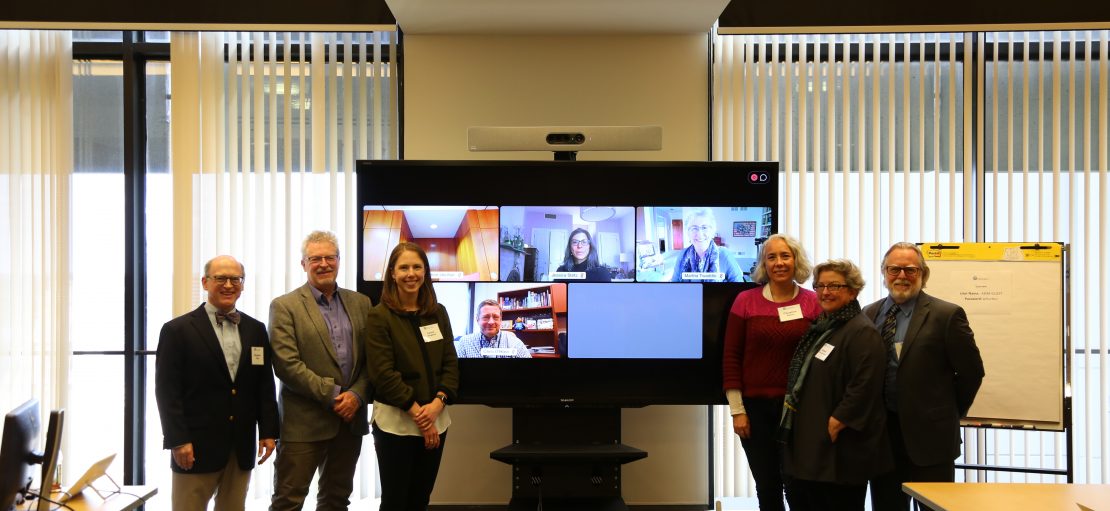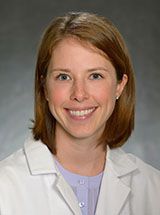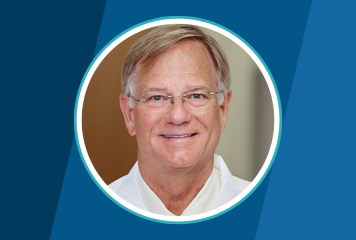The Hospice and Palliative Medicine Advisory Committee held its spring meeting on Monday, April 24, 2023. The agenda provided an opportunity to update the Advisory Committee on activity at ABIM and allowed for discussion of pressing issues in the field. The Hospice and Palliative Medicine Advisory Committee was joined by representatives from the American Academy of Hospice and Palliative Medicine (AAHPM).
The Hospice and Palliative Medicine Advisory Committee comprises public representatives in addition to physicians of the American Board of Medical Specialties (ABMS) member boards that cosponsor the discipline. The representatives are:
- Laura Dingfield, MD, MSEd, FAAHPM, Advisory Committee Chair; ABIM
- Stephen Hays, MD, American Board of Anesthesiology (ABA)
- Christine E. Kistler, MD, MASc, American Board of Family Medicine (ABFM)
- Michael McDuffie, Ph.D.
- Mary Lynn McPherson, Pharm.D., MA, MDE, BCPS
- David Nowels, MD, ABFM
- Christopher O’Hara, MD, American Board of Pediatrics (ABP)
- Jessica Stetz, MD, American Board of Emergency Medicine (ABEM)
- Martha Twaddle, MD, ABIM
The following is a summary of the spring meeting.
Administrative Board Update
Prior to the meeting, members and guests of the Hospice and Palliative Medicine Advisory Committee received a video update from Richard J. Baron, MD, MACP, President and Chief Executive Officer of ABIM and ABIM Foundation, highlighting progress and inviting discussion from the Advisory Committee on some of ABIM’s leading priorities, including:
- The planned release of the first Longitudinal Knowledge Assessment (LKA®) quarterly formative score reports to more than 28,000 ABIM diplomates who have completed the fifth quarter of their five-year LKA cycle. Diplomates participating in the LKA will receive these score reports as a way to let them know how they are performing relative to the passing score, and help identify any areas they may want to focus on in their future studies.
- ABIM’s ongoing work in diversity, equity and inclusion (DEI), such as performing differential item functioning analysis of assessment items, developing health equity content in different disciplines, co-funding health equity projects for residencies, and creating more inclusive opportunities for diplomates to self-identify on their Physician Portal.
- Developments from the ABIM Board of Directors’ strategic planning work, such as exploring how new technologies like artificial intelligence (AI) and machine learning may help ABIM work more efficiently and develop better programs for physicians.
- Continued work with a coalition of national medical organizations to address medical misinformation and promote evidence-based information. Dr. Baron recently coauthored an article in the New England Journal of Medicine and spoke at both the University of California San Francisco Department of Medicine Grand Rounds and South by Southwest on the topic of misinformation.
Members of the Advisory Committee raised questions around ABIM’s DEI work internally and with other organizations. Dr. Baron pointed out that DEI was a focus of the fall 2022 meeting of the Liaison Committee for Certification and Recertification, which gathers representatives of internal medicine medical society education programs annually. He also noted that ABIM works with a consulting firm to help advance DEI, and qualitative research staff conduct listening sessions with a range of demographic groups to help ABIM better understand and be more inclusive of the diverse diplomate population.
Discussion also continued around AI—how chatbots can impact medical education and what ABIM is exploring in this space. Dr. Baron emphasized that ABIM is thinking broadly about technology and how it can help the organization do its work better.
Misinformation and Implications for Hospice and Palliative Medicine
The Advisory Committee held an open discussion on the implications of misinformation for the discipline of hospice and palliative medicine, including its effects on patient care, in order to contribute to ABIM’s ongoing strategic conversations about the issue. In discussion, the group’s comments fell into three themes:
- Misinformed patients, particularly those who struggle to identify credible sources of information and then approach their physicians with fears about their symptoms or condition due to poor information online. Some patients are losing trust in physicians because they receive conflicting information and it creates challenges for hospice and palliative medicine providers as they navigate complex conversations between patients and their medical teams.
- Misinformation on opioids, such as false narratives or exaggerated descriptions of the dangers of opioids, and conflating prescribed opioids with illicit drugs (e.g., fentanyl) that are driving the opioid epidemic. In some cases, patients are not receiving the treatment they need because they are misinformed about properly prescribed and administered medications.
- Misinformation and misconceptions about hospice and palliative medicine, including a lack of clarity about the distinctions between these care services and whether a patient is eligible for one or the other. Even some physicians in other specialties misconstrue what palliative medicine is, Advisory Committee members reported, and a general lack of information and understanding about the discipline contribute to the rising proliferation of misinformation.
Special Consideration Pathways for International Medical Graduates
ABIM’s standard training requirements for certification include the satisfactory completion of accredited internal medicine residency and subspecialty fellowship training in the United States or Canada. In addition, there are four special consideration pathways to enable osteopathic or internationally trained physicians to obtain ABIM certification. The ABIM Council—which comprises the chairs of the individual specialty boards and advisory committees, as well as public and patient members—is exploring the idea of creating another special consideration pathway for international medical graduates (IMGs) who have completed their internal medicine residency training in another country and then completed accredited fellowship training in the U.S. or Canada. These physicians are currently not eligible to take initial specialty certification exams. In the proposed pathway, physicians would need to pass the ABIM Internal Medicine Certification Examination after satisfactory completion of Accreditation Council for Graduate Medical Education (ACGME)-accredited fellowship training to be eligible for subspecialty certification.
The Advisory Committee held a discussion about the implications of this potential policy change for the field of hospice and palliative medicine and raised questions about how it would work. Some members expressed concern that physicians would use the pathway to complete a one-year fellowship in hospice and palliative medicine rather than a three-year internal medicine residency accredited by ACGME in order to be able to practice general internal medicine in the United States. This outcome would not address the workforce needs that the proposed pathway might help address. It was noted that there are several existing pathways for IMGs to abbreviate their U.S. training based on their international residency. Questions also centered on why the pathway was being proposed, and members emphasized that the intent of the policy change should be made clear to stakeholders if ABIM moves forward with gathering feedback from them.
Naming the Certificate
The Advisory Committee held a discussion to explore perspectives on the name of the certificate and the implications of changing the name to focus more on palliative medicine. This discussion was prompted in part by prior suggestions from Dr. Twaddle (who in addition to serving on the Advisory Committee also chairs the Hospice and Palliative Medicine LKA Approval Committee). Dr. Dingfield emphasized that the discussion was just that—an exploratory discussion, and not the beginning of a decision-making process.
The Advisory Committee was given a brief history of the discipline including podcast interviews with founding physicians, current leaders in the field and stakeholders considering its future. The committee was invited to identify the stakeholders in this discussion and the potential implications of changing the name of the certificate.
Some members raised concerns about the impact on hospice-based physicians and stressed the need to present the potential change not as an expression of exclusion but as an affirmation that hospice is an area of added expertise within palliative medicine. They noted that changing the name may encourage recognition of hospice as a distinct field of focus and enhanced expertise within the broader scope of palliative care. Dr. Kistler suggested that independent credentialing in long term care within the field of geriatric medicine could be a good model when thinking about this change.
Dr. Twaddle emphasized that a potential name change would be about aligning the name of the certificate with the core knowledge that is assessed on the initial certification and Maintenance of Certificate (MOC) exams, as the hospice and palliative medicine assessments primarily focus on palliative medicine. Others noted that patients and families should be included in conversations about the name of the discipline.
Finally, counterarguments included considerations of the history and identity associated with the current name of the certificate, and that changing this could create confusion for patients and other health care providers, as well as the potential loss of identity for some physicians in the field.
Advisory Committee Oversight of Assessments
The advisory committees and specialty boards that oversee each discipline of internal medicine are responsible for reviewing and approving the assessment blueprints and standards for certification, MOC and the LKA. Each spring, the advisory committees and specialty boards review data related to the population of new graduates entering the discipline, diplomates maintaining their certification, workforce information, and assessment performance trends and feedback. Periodic review of these data helps to inform the advisory committees’ assessment decisions. The Hospice and Palliative Medicine Advisory Committee discussed assessment data in the discipline and provided feedback to ABIM staff about which data were most helpful for ongoing oversight of assessment. Some of the data the Advisory Committee reviewed (mostly related to ABIM diplomates and not necessarily indicative of diplomates certified by other cosponsoring boards) are publicly available on ABIM’s website, including:
- Relative distribution of fellows in training per discipline
- Percentage of first-year fellows who are female by subspecialty
- Initial certification pass rates by discipline
- MOC pass rates by discipline
- Number of candidates certified in each discipline each year
The Advisory Committee and guests also heard some information about the LKA. To date, 80% of eligible Hospice and Palliative Medicine diplomates have chosen the LKA. Staff also confirmed that data gathered over the first year of the LKA’s availability indicate that the median question response time on the LKA is two minutes.
Members of the Advisory Committee questioned whether trends in board eligibility lapses correlate to gender populations, such as women physicians taking maternity leave. Staff noted that there was no discernable gender difference in board eligibility lapses. In addition, they discussed how to more accurately determine the size of the hospice and palliative medicine workforce, including physicians certified by cosponsoring boards and non-certified practicing physicians, but concluded that this would be infeasible with the current sources of data.
The group also discussed the ongoing need for physicians to join the Hospice and Palliative Medicine Item-Writing Task Force and how to increase the number of applicants. They made suggestions to increase outreach to junior physicians at AAHPM and offer letters of recognition to item-writers’ supervisors, special service awards and opportunities to be involved in publications about LKA data. Information about how to apply to be an item-writer can be found online.
Dr. Dingfield and Dr. Nowels provided an update on the respective Advancing Innovation in Residency Education (AIRE) programs at the University of Colorado (where Dr. Nowels is a Professor in the Department of Medicine) and the University of Pennsylvania (where Dr. Dingfield is an Associate Professor of Clinical Medicine). Both programs are highly successful and have requested extensions to the duration of the AIRE pilots to allow more participants to take and pass the exam. When outcomes are available, the Advisory Committee will be responsible for approving the pathway as a standard option for eligibility to take the Hospice and Palliative Medicine Initial Certification Examination and make the recommendation to other cosponsoring boards to consider the same.
Finally, the Advisory Committee was informed that the Hospice and Palliative Medicine Certification Examination will now be offered annually starting in 2024 due to growth in the discipline. More information can be found on the ABIM blog.
Supporting a Quality Agenda in Hospice and Palliative Medicine
In late 2021, the American Board of Medical Specialties (ABMS)—which comprises 24 medical certifying boards in the U.S., including ABIM—published new standards for continuing certification. The standards include a requirement for member boards like ABIM to facilitate the development of a discipline-specific quality agenda. Richard G. Battaglia, MD, FACP, Chief Medical Officer at ABIM, spoke to the Hospice and Palliative Medicine Advisory Committee about the new standard. He emphasized that this standard is not resulting in an individual diplomate requirement to complete quality improvement activities for ABIM MOC and that requirements for other ABMS member boards vary. Dr. Battaglia invited the group to discuss how they envision ABIM engaging external stakeholders to identify issues that can serve as elements of a mutually agreed quality agenda in the discipline and the role the Advisory Committee can play in this process, noting further that the agenda sets the stage for the Advisory Committee to promote work in certain areas with specialty societies.
The group offered suggestions of organizations to work with, including the Institute for Healthcare Improvement, the Palliative Care Quality Collaborative and the Center to Advance Palliative Care.
Selection of New Approval Committee Members
The Hospice and Palliative Medicine Advisory Committee reviewed the physician candidates for open positions on the Hospice and Palliative Medicine Approval Committees. Applicants for open positions are interviewed and then recommended by the Approval Committees; the Advisory Committee reviews recommended candidates and makes the final selection for open positions.
Members discussed requirements and expectations of Approval Committee members, including the benefit of prior experience with item-writing, as well as the composition of cosponsoring board members on the committees. After discussion, the Advisory Committee voted to approve Drew Rosielle, MD, FAAHPM, of University of Minnesota Medical School to join the Traditional, 10-Year MOC Exam Approval Committee, for a term beginning July 1, 2023. In addition, the Advisory Committee approved Shih-Ning (Suny) Liaw, MD, of the Dana-Farber Cancer Institute and Boston Children’s Hospital and Martina Meier, MD, of Providence Health & Services for open positions on the LKA Approval Committee for terms beginning July 1, 2023.
There are still open positions on the Item-Writing Task Force. Openings in Hospice and Palliative Medicine, as well as all other specialties, can be found online.
Update from the Hospice and Palliative Medicine Approval Committees
Susan D. McCammon, MD, University of Alabama at Birmingham; Hospice and Palliative Medicine Traditional, 10-Year MOC Exam Approval Committee member
Martha Twaddle, MD, Northwestern Medicine; Chair, Hospice and Palliative Medicine LKA Approval Committee; member, Hospice and Palliative Medicine Advisory Committee
There are two ABIM Approval Committees working with the Hospice and Palliative Medicine Advisory Committee: the Traditional, 10-year MOC Exam Approval Committee (which also works with the initial certification exam) and the LKA Approval Committee. Approval Committees are responsible for approving all assessment content and maintaining the assessment blueprints in their discipline. Drs. McCammon and Twaddle updated the Advisory Committee on the composition of the Approval Committees, recent activity and the current state of the Item-Writing Task Force in the discipline. They reminded the Advisory Committee of the need for item-writers and encouraged committee members to recruit potential candidates. Openings in Governance and the Item-Writing Task Force can be found online.
Communications and Governance Engagement
John Held, Senior Director of Communications, and Peter McConnell, Program Manager for Governance and Medical Society Communications, updated the Advisory Committee on ABIM’s ongoing communications work with Governance (the ABIM Board of Directors, ABIM Council, Specialty Boards and Advisory Committees, and Approval Committees) and invited members to participate in engagement work. The communications team regularly engages ABIM Governance members to help give diplomates a better understanding of the individuals representing their interests in each discipline, and to help the community better understand the value of certification.
Advisory Committee members provided feedback about how they could continue to take an active role in ABIM’s communications initiatives with diplomates, the medical community and the public, such as through media interactions, the ABIM blog and working with their colleagues and medical societies.
In Closing
The Hospice and Palliative Medicine Advisory Committee values the feedback and commentary of the entire medical community, including diplomates and society partners.
Do you have any questions? Are you interested in getting involved?
If you are certified by ABIM and have questions after reading this report, please connect with us through the following channels:
- Subscribe to the ABIM blog.
- Call 1-800-441-ABIM (2246).
- Email request@abim.org.
- Join our Governance to help guide our future direction.
- Join our Community Insights Network (available to ABIM diplomates only) to share your feedback.




